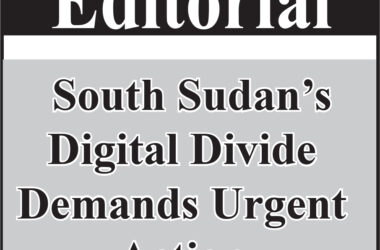By Gama Hassan Oscas
South Sudan, a nation emerging from a long and devastating conflict, faces numerous challenges as it strives to establish a stable and inclusive political system. In such circumstances, the effectiveness of electoral laws becomes paramount in shaping the democratic trajectory of the nation. This political opinion explores the crucial role that effective electoral laws play in building a nation like South Sudan, where the establishment of transparent, fair, and inclusive electoral processes is essential for sustainable peace, reconciliation, and democratic governance.
Fostering Legitimacy and Trust:
Effective electoral laws are instrumental in building the legitimacy and trust necessary for a post-conflict nation like South Sudan. By ensuring transparent and credible elections, these laws provide an avenue for citizens to actively participate in shaping the political landscape. In doing so, they give the population a sense of ownership over the democratic process, which fosters trust in institutions and strengthens the legitimacy of elected representatives.
Promoting Inclusivity and National Reconciliation:
In a nation emerging from a protracted conflict, effective electoral laws are vital for promoting inclusivity and facilitating national reconciliation. These laws can incorporate mechanisms that encourage the participation of diverse communities, ethnic groups, and marginalized populations in the political process. By ensuring fair representation and opportunities for all, electoral laws can help bridge deep-seated divisions, mitigate tensions, and promote a sense of unity and shared national identity.
Preventing Electoral Violence and Conflicts:
The enforcement of effective electoral laws is instrumental in preventing electoral violence and conflicts that could undermine the stability of a nation like South Sudan. By establishing clear guidelines for campaign conduct, financing, and the resolution of electoral disputes, these laws create a framework for peaceful political competition. They also enable the impartial adjudication of electoral grievances, thereby preventing grievances from escalating into violence and ensuring that disputes are resolved through peaceful means.
Enhancing Governance and Accountability:
Effective electoral laws can play a pivotal role in enhancing governance and accountability in a post-conflict nation like South Sudan. By instituting transparent campaign financing regulations, disclosure requirements, and strict enforcement mechanisms, these laws can combat corruption and undue influence in the political process. They provide a framework for holding elected officials accountable, ensuring that they serve the best interests of the people and contribute to the development and stability of the nation.
Building Democratic Institutions and Rule of Law:
The establishment of effective electoral laws is fundamental to building democratic institutions and strengthening the rule of law in a nation like South Sudan. These laws can provide the legal basis for the creation of independent electoral commissions or bodies responsible for overseeing and administering elections. By ensuring their autonomy, impartiality, and capacity, electoral laws contribute to the development of robust democratic institutions that can withstand political challenges and effectively safeguard democratic processes.
In conclusion, effective electoral laws are crucial in building a post-conflict nation like South Sudan. They foster legitimacy, trust, and inclusivity while preventing electoral violence and promoting national reconciliation. These laws enhance governance, accountability, and the rule of law, contributing to the development of resilient democratic institutions. South Sudan must prioritize the establishment and enforcement of such laws to pave the way for a peaceful, inclusive, and prosperous future. International support and cooperation can also play a significant role in assisting South Sudan in developing and implementing effective electoral laws that meet the unique challenges it faces.
The writer can be reached on the email: oscarsgama @gmail.com



